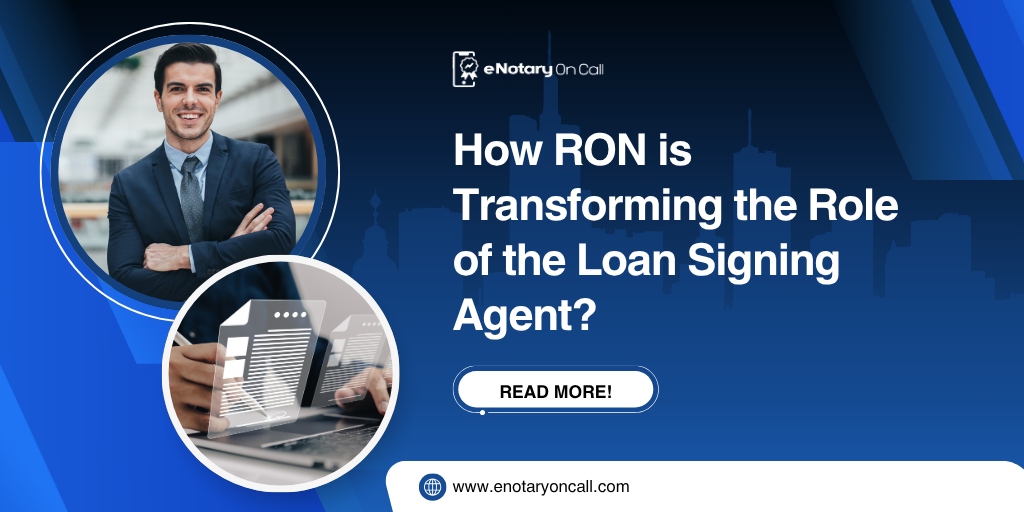In the real estate market, it has been observed that buyers’ expectations when purchasing a property have undergone a paradigm shift from traditional to modern. Clearly, visits to personal or commercial properties are now taking a step forward digitally. Buyers are increasingly preferring the digital multistage process of borrowing. And this digital approach is also increasing the use of remote online notarization in Florida. Witnessing such a preference, notary loan signing agents are also expanding their document notarization services to include remote online notarization.
To begin with, it is first essential to have clarity about the Notary Loan Signing Agent, as they provide this solution. Thus, to start with, first understand
Who is a Notary Loan Signing Agent?
In real estate transactions, many documents are involved, inclusive of loan documents. The individual who handles the loan documents and is trained to do the necessary tasks is explicitly a notary signing agent. Some companies act as lenders or title providers; they hire these contractors, who independently handle the procedures related to loans and their funding.
This is concise information about them. Now comes the key responsibilities which a notary signing agent does during the loan signing.
- Take care of the prints for every important loan document
- Connect with signers and get their sign for notarization
- Once the document is completed, make sure it is with the right person
- And also take care of additional tasks if required, such as mailing or faxing the document to a specific office
A noteworthy factor that signers or companies should keep in mind is that the notary signing agent cannot help with legal advice. For legal assistance, it is advisable to consult with trusted and licensed legal professionals.
The above explains the role of a notary signing agent and their responsibilities, which follow the traditional approach. As the digital era is taking over the real estate industries, thus, the loan signing agents are also adapting the online method.
Another question that often arises for people is how loan signing agents differ from notary publics. As the responsibility also includes connecting to signers for document signature. Thus, here is what you need to know.
Loan Signing Agent Vs Notary Public
Let’s compare them on factors to get a clear understanding of the scope of work, role, training, and fee.
- Scope: A notary public is authorized to witness and verify signatures of individuals on general documents, inclusive of contracts, wills, or deeds. However, a loan signing agent handles particularly loan documents of the real estate industry. The documents include a mortgage, an equity loan, and a finance.
- Role: The primary role of a signing agent is to handle documents, which involves guiding the signer to sign whenever required. Furthermore, assist them with the complete process involved in the loan package, while explaining the documents. The notary public verifies the identity of the signer and also confirms that they are willingly signing the document.
- Training: Notary publics are licensed, hence minimal training is required, and they are also commissioned by the state. On the other hand, notary agents require certificates to handle the loan and mortgage documents. Additionally, they require more training than a Florida notary public.
- Fee: The notary public charges for every notarization of a document. But loan signing agents have a fixed fee for the service, inclusive of notarization, communication with the borrower, and time to guide them through the process.
Now that it is clear how both are different, it comes to understanding how remote online notarization is being utilized by notary signing agents, which is reshaping the loan signing process.
How RON is Transforming the Notary Signing Agent Role?
When real estate processes, such as loan applications, property visits, or closing deals, are influenced by technology, why can’t loan signing agents use the same technology for the loan signing process?
The notary signing agents are using the best RON platforms like eNotary On Call, which involve processes such as:
- ID check
- putting up a signature and a seal
- recording verification and witness signing
- and document storage
The tool not only increases speed but also eliminates errors, incorrect appointment scheduling, and missed signatures in areas where they are essential.
Furthermore, it also benefits notary signing agents by saving them time, which is typically spent on travel. They can now attend to more clients in a day, replacing previously scheduled appointments and last-minute cancellations. The expanded window of connecting clients and using a tool to complete the signing process is allowing them to close deals faster.
Undoubtedly, RON benefits the Signing Agent, but is it also a help for borrowers and lenders? Hence, to answer the query below, a brief explanation is provided.
Benefits of RON for Borrowers and Lenders!
There are segments where remote online notarization is making loan signing and closing of deals quick.
- Customer Experience: The complete notary process has become more convenient for both borrowers and lenders. They can easily have their documents notarized at any time to submit wherever required.
- Cost: It benefits borrowers as they will not have to bear the increasing holding costs. While lenders do not have to spend additional amounts which goes into traveling or managing administrative tasks.
- Turn Around Time: Both borrowers and lenders will not have to spend hours or schedule a day to complete the process. Specifically for lenders, the loan cycle process will be reduced in terms of time, as deals close more quickly.
Security and Compliance in RON!
There is no doubt that RON benefits all parties involved: notary signing agents, borrowers, and lenders. However, the question that arises with RON is one of security and compliance.
Thus, acknowledging these factors. From a security perspective, RON or digital tools offer a solution that does not compromise when it comes to identity or similar verification. The documents cannot be forged, and making records tamper-proof verifies their validity as well. There is secure storage, which eliminates the loss of records for notarized documents.
In terms of compliance, RON solutions and their platforms are designed to adhere to relevant laws and specific state regulations. It is securing the electronic journal, which is non-negotiable and is subject to a notarial act that must be followed without fail. The RON is compliant to HIPAA regulations to keep information confidential. And the platforms have certification from MISMO and adhere to robust industry standards.
Conclusion
Loan notary signing agents in Florida are closing deals using the remote online notarization process while guiding clients through loan documents. Hence, searching for a loan signing agent near me will connect you with a notary agent to assist with every critical task related to loan documents, such as training, signing, or submitting them via mail or fax. Their presence is not only assisting both borrowers and lenders but also increasing the use of remote online notarization platforms.
This benefits the notary agent by saving their time and allowing them to reach out to many clients in a day. Furthermore, their preference for using the online notarization services method also benefits borrowers and lenders, improving their customer experience and saving time.
FAQs
Q1: What is a loan signing agent?
Loan signing agents help specifically with loan documents. They handle tasks such as connecting with signers, guiding them through the process, and assisting with the signature at places where required. They also help with document notarization for closing deals and sharing documents via email. They handle documents related to loans or real estate and are commissioned by the state.
Q2. What is the role of a loan signing agent?
The roles include identity verification, ensuring accurate signing, acting as a third-party intermediary, handling loan packages, minimizing errors, and delivering documents on time.
Q3. What types of loans require a signing agent?
Most of the loans require a signing agent. These include home purchasing, refinancing, home equity credit, reverse mortgage, or seller-side transaction documents.
Q4. Is a Loan Signing Agent the same as a notary public
No, they are different. Loan signing agents need additional training to handle complex documents related to real estate and mortgages. For information, all loan signing agents must be commissioned notaries public.
Q5. Can a Loan Signing Agent notarize documents online?
Yes, they can provide document notarization services using remote online notarization if they are commissioned as a Remote Online Notary. Using a trusted platform which brings signer and notary public, they can easily verify identity and do documents check using audio video technology. Further, signing and sealing, and notarizing document.

